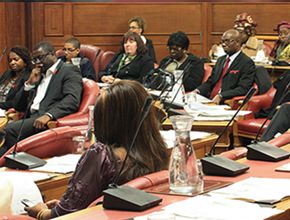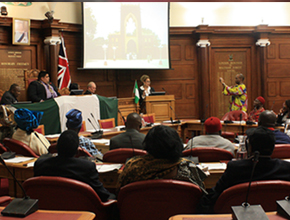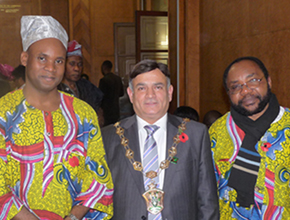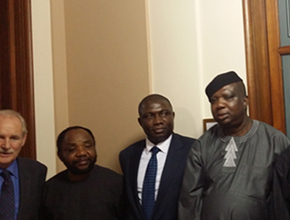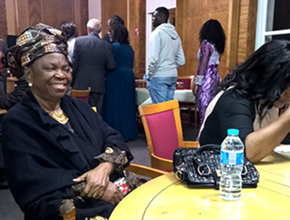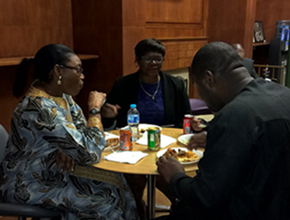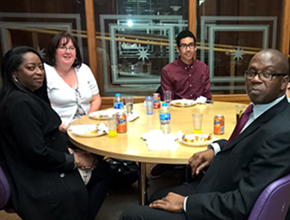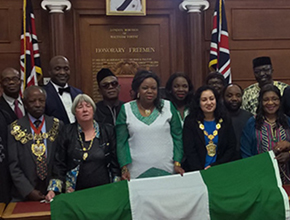Nigeria
Leaders and Personalities:
Leadership in Igbo or Nigeria is not comparable with the Judges or Kings in Israel except that they ran with the cones. Do not forget that the Royal Niger Kompany groomed the Igbos as traders and till-date; they are behind others in developing efficient political maxims and systems. Igbo for long refused colonial agenda; it became a part of Nigerian system in 1933 after the settlement of the Aba Women Riots. Soon Chief Ojukwu, Dr. Azikiwe, Dr Akanu Ibiam, Inyang, Eyi Ita, Mbonu Ojike and Dr Okpara climbed high as educated or enlightened elites. During the rift, Col Emeka Ojukwu was the Igbo hero against northern aggression and inhumane treatments. Nevertheless, the Igbos lost narrow count since 1970 or more so 1983. The broad and thin brooms do not sweep alike; at the turnaround, no one sheep, goat or dogs benefited from the strategies.
As Igbo, Benin, Yoruba, Tiv and Hausa as with Nigeria in dog and monkey style of life, there are no heroes or intellectual uprightness because everyone cuts sharp edges for personal aggrandisement. There is no sound patriotism or nationalism for which good leaders are to promote. For instance, when the first Prime Minister of Nigeria was interviewed: he said: that he saw himself as a Sokoto, then Hausa; then, Northerner and then, a Nigerian. He towed Joseph Satin's axiom. Chief Awolowo on the other hand said that Nigeria is a geographical expression and the third founding father Dr. Azikiwe was afloat. Their politics of self-aggrandisement rocked the first federation. The downfall of Gen Ironsi as well as Gowon and Muritala revealed the fragile nature of the country.
If we turn to blame, whom shall we blame? We cannot blame anyone for any yoke that was beyond him. Even Obasanjo assumed power after Muritala; he was not elevated mentally for the duties in addressing what he knew caused the first coup. Handing over to Shagari was like handing over a green snake to pretend that Nigeria has returned to civil rules but lacking fundamental principles, it crashed on 31 December 1982. Buhari (ACPN) presidential candidate for 2011 election and Idiagbon took over from Shagari over budget issues but crashed to Babangida in 1985. IBB tried possibly his best and said in 1993 that Nigeria failed all economic, management, scientific and political principles and practices. So, Nigeria is unmanageable, is it or that we adopted wrong methods?
Abiola, Abacha and Ernest were victims of unmanageable system. Abubakar, very wise, did not want to add to the list of victims, he handed over to Obasanjo, who with knowledge of Nigeria from 1960, stayed in power from 1999 to 2007 and left no legacy. YarAdua (May his soul rest in peace) may have had good intention but unexpressed in principle or action. Jonathan won the 2011 Presidential election, what do you expect? Politicians are known to be butterflies and grasshoppers . Their best successes are never political but economic and social approaches to problem solving. With Nigerian population climbing to 152 million people and 76 universities excluding colleges of further education producing over 350,000 graduates yearly, what is the agenda?
The challenge is not political but economic arrangements to task these graduates to go beyond paper qualification. This is what challenges Nigeria now. Can 152 million people feed from the international markets? No or Nigeria will bankrupt. The non-political personalities of Nigeria are few or not known because of the shape and form of Nigeria, which make it difficult to acknowledge worthy contributors. The most outstanding question is the political systems in operation in Nigeria, very expensive with little or no ontributions. Nigeria started with Parliamentary, now Presidential because her eyes still project outwardly; cannot Nigeria with her education and experiences design Nigerian system for herself? Lastly, the politics of north and south has been defended since 1947 and should be reviewed structurally to draw a comprehensive framework for developing Nigeria suitable for any Nigerian in any part. The partly implemented proposals of 1911 in 1991 beg for review for full implementation. The proposals had reasons but the implementations lacked reasons and the whole versions should be re-examined. Sucker well is not the answer to good sanitary system. One-quarter electric current is not good electric supply. A review for a system to pick every soul begs for attention and determination. Wonders are yet happening; is Britain right to support one Nigeria unmindful of its proposals of 1911 that gave rise to Nigeria? If it does, the issues will boomerang. If so, we pray and invite the Almighty God, the Supreme Governor of the heaven and earth to judge and render solutions.
Igbo-Nigeria-Homeland:
The exploration of the people now called Nigeria began in 520 BC by the Phoenicians laid by Hanno and in 1400s by Portugal and Spain. Britain came into it in 1851 as mentioned below. It should be remembered that it was a stage play and Nigeria plays as designed for convince and merchantable objectives. Until 1884, Igbo was one unit with Cameroon. In 1885, the West African Berlin Conference (1885) caused division. In the same year, Britain retained territorial control over the north mainly the Bornu-Kanem Empire with its main cosmopolitans in Kwandu (Bornu) and Sokoto. German took Cameroon, which it surrendered to France in 1919 as reparation of the WW1. Britain kept Igbo side under the control of the foreign office and exploited by the business groups of the Royal Niger Company until 1899 when it was bought out with £1m and transferred to the Colonial office. The British had maintained a territorial command of Lagos since 1851 and made peace in Egbaland in 1857. Britain annexed Lagos in 1861 to fight against the slave trade. The political conquest of these people started in 1885 with the case of Kosoko and Akintoye; next was the conquest of Edo (Bight of Benin) in 1897. With this Yoruba (west) and Benin former Bight forged into one in 1906. The Igbo having requested direct rule from Her Majesty Queen Victoria in 1896 refused indirect rules that have applied to the northern Emirs and caliphates. This led to the Aba Women Riot of 1927-1932. Then, there were the western, Oil River or Niger coast alas Bight of Biafra and northern protectorates. Between 1906 and 1908, the British forged the west, Benin and Biafra into what was known as the southern protectorate. This was the spring board for the proposals of 1911 for the amalgamation of the northern and southern protectorates. The Amalgamation Proposals with reasons of four regions with the federal capital suggested at Mt Parte (Abuja). No reason was given except the WW1 for the implementation of the unintended on 1 January 1914. After the WW1, Nigeria was on secondment with no mind of its own until after the WW11.
The politics of north and south was imposed and there was no consensus at any point. Remarkably, when people who used to live covenantally live without it, widens the scope of expectations and surprises. That the people pretended what they are not materialised stage by stage from 1945. What does a trader know of constitution? The pace was rapid even when the north objected Chief A Enaharo's motion for self-govern in 1953 for 1956 served a good lesson to review approaches. The negotiations were psychedelic and undermining according to what E.D Morel described as half-educated elites, who assumed knowledge but failed the psychology test of true solution. It back fired in 1960, when the election result was announced before the count and national census forged to expedite such false result. What happened called for review but Nigeria went on for Republican status in 1963, i.e., has achieved full independence.
The unable to walk but easy to limp stalled in the 1964 elections, which finished well in the east but protracted to the November 1965 in the north and west. In Nzeogwu, Obasanjo described what happened that led to the first military coup by Nigerian army on 15 Jan 1966. Since 1966, there have been six coups and two attempted. It is over 40 years of the war (1967-70) but killing the Igbos or southerners for any reason (race or religion) continues up date. This calls for inquiry in this decade or millennium on how best to re-arrange Nigerian communities to ensure terms and conditions to live together. In 1838, 1953, 1967, the North forced wars on the Igbos always aimed to kill and loot their assets. In 2017, the Northern ‘Arewa people’ issued mandatory automatum for the Igbos to leave the North and leave them alone. However seen, the joint tenancy of Nigerian Federalism has waned to a slightest indication of share and divide. This reduced the next option to tenants-in-commons, which inevitable is devolution to the regions. Oh heaven see; oh earth hear; this is the only remedy to Nigeria. Any other options have been and will be unacceptable to the levels of population, corruption and styles of life of the various parts of Nigeria. No communities in Nigeria can transplant another but terms and conditions must be discussed, negotiated and agreed to enable the development of Nigeria for every Nigerian. The situation in Nigeria is hurting the Igbos who believed that they can live anywhere and forge good neighbourhood. This is only interest of a few and not restrictive of any other constructive alternatives. The in-fighting in Nigeria is a great temptation for people naturally positioned to appreciate each other. The Nigerian situation has not changed from T. Balewa's views of 1947 and A Bello's statement in the General Conference at Ibadan (1950). Nigerians cannot be matured on paper independence without keen interest in understanding and perceiving the odour of their neighbours' mouth. Things have continued analogously and what Boko Haram and his team are expressing require careful consideration. You can take the horse to the waterside but not force it to drink. Boko Haram operates in politically controlled region; it will be a mistake to assume that he is alone or empty of agenda. Nigeria has taken enough blood; moreover, if we have matured, we should consider his reasons and seek for solutions most acceptable to his/our community. We cannot rule out the religion of the people in any solution. If a part does not want Western Education, it cannot be forced but allowed to practise what it wants while those who want Western education are allowed to assess themselves on it. How can we live peacefully is the point? How ever it is achieved to strengthen neighbours should be considered. At the turn of the 21st century, it is no longer nationalism but the terms and conditions to live peacefully because everyone singly or collectively has his life to live. That we meet or are brought together by foreigners is no longer a viable path. It has destroyed our value system, respect and progressive admiration of each other. A new era is born, what is Nigeria about or offering its citizens? If we belong and labour together, when the apples ripe, they must go round or shall we look elsewhere for something we should get at home? Oh where does our relatedness begin, work and/or end? One Nigeria! One People! One Fate;is the task theorem or practice? Nigerians are still among the best people in the world but their administrative arrangements easily betray them. As A Balewa stressed in 1947, it is a mark of foolery to try to cover up pregnancy. Hausa has not changed to become Igbo, nor have the other parts changed to become Hausa or Yoruba but the administrative concern is to organise each to enable maximum contributions. The nation so far misplaced its priorities, which easily produce nonchalant results. The goodwill between the governors and the governed, where is it? A day to remember is a day to review for better collectivism, where are we? How best can we restructure to get the best for and from its citizens?
Religion and Education (achievements/contributions):
Recently (AD 1800s) and suddenly, the people became hyper-sensitive to religion than to God. Their practices constitute flocking to the place of worship and demonstrating it against each other; it is not worship of God but kiths and kin in greedy struggles. Is there any Igbo person who does not know Eke, Orie, Afor and Nkwo purposes? Who else shares these market days with Igbo? One voice! One voice, do we cut off our mouths to it or agree that Eke is Eke and Orie is Orie? Our ancestors did not attend Universities but sent us to see beyond them, what did we see? With their approaches they developed Igbo made up of at least twenty districts in 1908; how did we retain, maintain or sustain their views of Igbo? The environment is chaotic like in the days Prophet Jeremiah was telling Israel of God's refusal to listen to their prayer because their state of affairs was unacceptable to God. Can anyone impose himself on God? Are the Igbos truly religious with Eucharist and not with the sanctity of the kola nut? Where did the bickering kin and kiths leave trust and confidence in Igbo? Previously, when situation squares badly, our ancestors will search themselves, identify cause and covenant or put sanctions to check developments; is Jesus less Igbo in his covenant with bread and wine? Whatsoever, whosoever and anything that turned the Igbos into hybrids is cancelled. Our ancestors climbed high trees from the root, which enabled them to measure length worked but our top-down promotes abject greed and grief; a change is necessary. True worshippers of God should tell but the most measurable covenantal style seems undermined because of in-fighting among kin and kiths. There is only one outstanding issue with religion and that is what various Christians and Moslems can produce alone or in combination in Nigeria. Nigeria is very religiously tensed and this sets fire in any minute. The problem bounces back to check the type of training provided to the parties to know and appreciate each other first before God they pretend to but living together with the usual human prejudices easily turns out the unexpected chaos. For reasons beyond doubt, it is not at NYSC level but earlier that the youths of the nation should interchange to learn and know their countries earlier as to incorporate their knowledge into further education of suggesting improvement in system and developments of untapped resources. The uneasy lies the head did not prevent the 2011 killings of the NYSC in the North. People, who worship God and fight over it, have not allowed God to judge. Christianity is personally empowering and Islam meaning: I live to serve living Allah and man are all challenging in output of which blood is never expected. As the Old order draws to a close and new Era begins, there is need for reconsideration of the best way to live together. Education could be useless if commonsense of purpose lacks. Is the current Eze the answer or one upon whom public confidence and works are based?
Commerce and Industry:
Can you trade if you have no commodities? Before coming in contact with any outsiders, Igbo had advanced in farming and producing yam, coco-yam (Ede) and various Crops and fruits; thus, had enough to feed itself. They had also advanced palm produce culture of taming, culturing, harvesting palm nuts, processing them with long mortar. They had made palm oil, kernel, fibre1, soap (ncha nkota). They had produced melon (egwusi, ogbono, okoro and akidi, akara (beans). This was subsistence farming and everyone was involved in it and even took titles of Ezeji according to yearly harvest. The Royal Niger Company was busy with the Palm Produce to Europe used for lubricating plants and production of staple items e.g., Soap, Blue Bird Margarine. In the Nigerian annual report of 1957, the east accounted
The east accounted for 72 per cent of Nigeria’s revenues to enrich. The Igbos partnered the Royal Niger Company in the Palm produce, slave trade and development of hide and skin and groundnut commodities in the North. In the 1897 wars, the Igbos joined the Edos to fight the West Afrikan Frontier Forces wars at Iddo but now the Igbos are treated as aliens, non-indigenes and unwanted in the West and North, which is not bad to say but good to remind them of home pride (ugwu-ulo). Never late is the motion of evolution and one’s waking time is his morning to answer presence to God.
